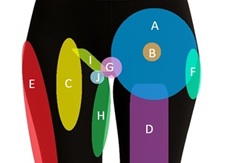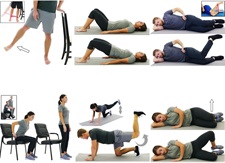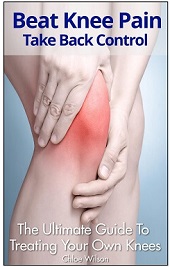- Home
- Hip Pain Diagnosis
- Front Hip Pain
Front Hip Pain
Written By: Chloe Wilson, BSc(Hons) Physiotherapy
Reviewed by: KPE Medical Review Board
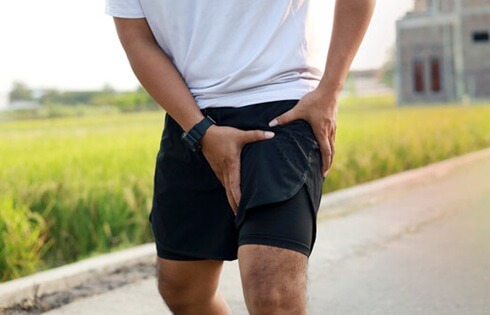
Front hip pain, aka anterior hip pain, is a common problem that can affect people of all ages and activity levels.
It’s a frustrating problem that can limit your ability to walk, sit, exercise, or even sleep comfortably.
Pain in front of the hip may come on suddenly from an injury or build gradually over time from overuse or irritation.
In this guide, we’ll explore the common causes of front hip pain, how it’s diagnosed, key symptoms, and the most effective treatment options to help you get back to doing the things you love. If your pain is in a slightly different location, check out the outer hip pain and inner hip pain articles or our hip pain location charts.
What Causes Front Hip
Pain?
There are a number of reasons why you might experience pain in the front of your hip, so here are the most common culprits:
1. Hip Impingement Syndrome
One of the most common causes of front hip pain is Hip Impingement Syndrome, aka Femoroacetabular Impingement or FAI.
Hip impingement syndrome is a condition where the bones of the hip joint rub abnormally against each other due to structural abnormalities.
There are three types of hip impingement:
- Cam Impingement: where the femoral head is misshapen, and
- Pincer Impingement: involving excessive bone growth in the hip socket
- Mixed Impingement: where you have a combination of Cam and Pincer impingement
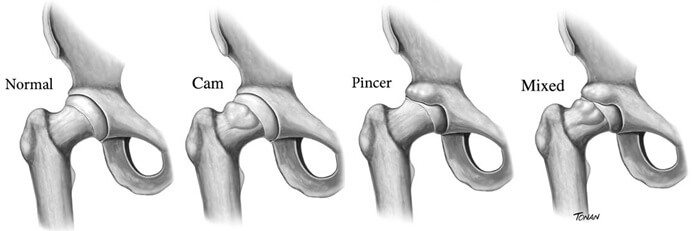
Over time, repetitive friction can damage the joint cartilage and labrum, leading to sharp front of hip pain during movement, particularly when bending at the waist, twisting, or sitting for long periods. FAI often affects young adults and athletes.
Find Out More: Femoroacetabular Impingement
2. Hip Labral Tear
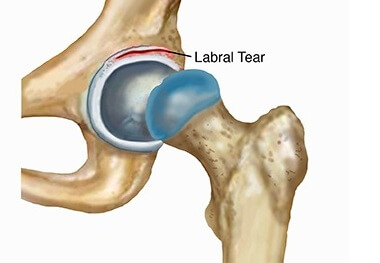
A common cause of front hip pain and clicking is a hip labral tear.
The hip labrum is a ring of cartilage that surrounds the socket of the hip joint, providing stability and cushioning. Tears can occur from trauma, impingement, or repetitive twisting motions.
Common in athletes who play sports like soccer, dance, or hockey, a labral tear may cause catching, clicking, locking, or pain in the front of the hip.
You might notice weakness or stiffness, and symptoms typically worsen with prolonged sitting or pivoting movements.
Find Out More: Hip Labral Tear
3. Hip Osteoarthritis
The most common cause of pain in the front of the hip in people over 50 is arthritis.
Hip osteoarthritis (OA) is a degenerative joint condition where the cartilage that cushions the joint wears away, causing the bones to rub together. It often leads to pain at the front of the hip or groin, stiffness, reduced range of motion, and difficulty with activities like walking, dressing, or climbing stairs.
Front hip pain symptoms from arthritis are often worse in the morning or after rest, and can gradually progress over months or years. Although more common in older adults, OA can affect younger people with joint abnormalities or prior injury.
4. Hip Flexor Strain
Another possible cause of anterior hip pain, particularly in athletes is a hip flexor strain.
Your hip flexors are the muscles that help you lift your knee and bend at the hip and are crucial for walking, running, and climbing stairs. A hip flexor strain occurs when one of these muscles, such as the iliopsoas or rectus femoris, is overstretched or torn. Hip flexor strains usually occur during activities involving sudden acceleration, kicking, or overstretching.
Pain is typically sharp, located at the front of the hip or groin, and worsens with hip flexion or walking uphill. You may also feel muscle tightness or weakness.
Find Out More: Hip Flexor Strain
5. Iliopsoas Bursitis
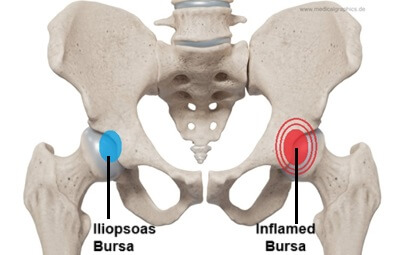
Inflammation of the bursa at the front of the hip can cause anterior hip pain, known as iliopsoas bursitis.
The iliopsoas bursa sits just in front of the hip joint and acts as a cushion between the iliopsoas tendon and the pelvic bone.
When this bursa becomes inflamed, usually due to overuse or friction, you’ll feel a deep, ache in the front of your hip, particularly with hip extension or rising from a seated position. There may also be tenderness when pressing over the groin and a snapping sensation during movement.
Find Out More: Iliopsoas Bursitis
6. Hip Flexor
Tendinopathy
Hip flexor tendonitis is a chronic overuse injury involving the hip flexor tendons, particularly the iliopsoas. It’s different from a strain as there is inflammation or degeneration in the tendon, rather than tearing in the muscle.
Hip flexor tendinopathy develops slowly over time due to repetitive movements such as running, cycling, or dancing. The pain is often a dull ache in the front of the hip or groin, made worse by activities that involve lifting the leg. There may also be tightness, weakness, and reduced hip range of motion.
Find Out More: Hip Flexor Tendonitis
7. Snapping Hip Syndrome
Snapping hip syndrome is a condition where a tendon or nerve flicks over part of the hip bone, causing a popping or snapping noise or sensation as you move the hip.
It typically affects active individuals who regularly take part in sports including dance, martial arts and soccer.
In many cases, the snapping or popping sensation is completely painless, but over time secondary problems can develop such as bursitis which starts to cause front hip pain.
Find Out More: Snapping Hip Syndrome
8. Nerve Compression
Sometimes front hip pain isn’t coming from the hip joint itself but rather from nerve compression. The femoral nerve or lateral femoral cutaneous nerve can become compressed or irritated, leading to pain, burning, tingling, or numbness in the anterior hip and thigh. This can occur due to tight muscles, spinal issues (such as disc bulges or spinal stenosis), or prolonged pressure (e.g., from tight clothing or a heavy belt).
Nerve-related hip pain may radiate down the front of the thigh towards the knee and foot, and is often associated with pins and needles, numbness and weakness. Find Out More >
8. Femoral Hernia
Front hip pain that is accompanied by a lump or bulge is often due to a femoral hernia.
More common in women, especially older adults, femoral hernias appear as a painful lump in the upper thigh or groin. Symptoms may include groin discomfort that worsens when standing, lifting, or straining, and in severe cases, abdominal pain and vomiting.
Symptoms of Front Hip
Pain
The symptoms of anterior hip pain can vary depending on the cause, but common signs include:
- A dull ache or sharp stabbing pain in the front of the hip or groin
- Anterior hip pain that worsens with activity, especially climbing stairs, walking uphill, or running
- Hip stiffness in the morning or after sitting for long periods
- Clicking, catching, or popping sensations in the hip
- Difficulty lifting the leg or rotating the hip
- Weakness or instability in the thigh and hip muscles
- Numbness, tingling, or burning which may extend down the leg to the foot if nerves are involved
- Difficulty sleeping due to hip pain at night
Understanding the pattern and triggers of your symptoms can help narrow down the cause and guide treatment for your pain at front of the hip. Any of these symptoms can result in reduced hip range of motion, strength and control.
Diagnosing Front Hip
Pain
Accurate diagnosis is really important with pain in front of the hip to make sure you get the right treatment.
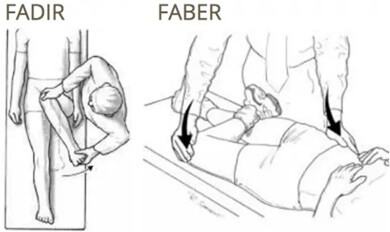
Your healthcare provider will begin by asking about your symptoms, activity levels and injury history.
They will then carry out a physical examination will include range-of-motion testing, strength assessments, and some special tests to pinpoint the cause of your front hip pain, such as the FABER or FADIR hip tests.
Diagnostic tools for front of hip pain may include:
- X-rays: to check for bone abnormalities, arthritis, or impingement
- MRI scans: to evaluate soft tissue injuries like labral tears or tendinopathy
- Ultrasound: helpful for assessing muscle or bursa inflammation in real time
- CT Scans: occasionally used for detailed views of bone structure
- Nerve Conduction Studies: if nerve compression or referral from the spine is suspected
When to See a Doctor
You should seek medical advice with anterior hip pain if:
- Your pain lasts more than a few days or worsens over time
- You feel weakness, instability, or reduced hip function
- There is visible swelling or bruising
- You experience clicking, locking, or giving way
- Your front hip pain interferes with sleep, walking, or normal daily tasks
- You have symptoms of nerve involvement (numbness, tingling)
#CommissionsEarned from Amazon on qualifying purchases
Treatment for Front Hip
Pain
Anterior hip pain treatment depends on the underlying cause but usually starts with conservative options such as:
1. Rest and Activity Modification
Avoid activities that aggravate your symptoms, such as high-impact exercise, squatting, or prolonged sitting in the early stages of front hip pain. Follow PRICE principles:
- Protect: the hip from
further injury e.g. using crutches
- Rest: from aggravating
activities initially but not for too long! Short rest periods can help acute
flare-ups, but long-term inactivity can make things worse as the leg quickly
becomes weak and tight
- Ice: Apply ice packs
for 15–20 minutes several times a day in the early stages to reduce pain in
front of hip and inflammation. After the acute phase, heat can help relax tight
muscles and improve flexibility
- Compression: wearing a
compression bandage or hip brace can help to support the joint and reduce
swelling
- Elevation: keep the leg elevated on a leg cushion when lying down to reduce swelling
2. Medication
Over-the-counter pain relievers such as ibuprofen or naproxen can help control front hip pain and inflammation. In some cases, your doctor may prescribe stronger anti-inflammatories or muscle relaxants.
Anti-inflammatories should not be taken for the first few days after an acute injury as they can actually slow down the healing process. Pain relievers such as paracetamol/acetaminophen can be taken immediately.
3. Physical Therapy
A tailored rehab program is often the key to long-term recovery with pain in front of the hip. A physiotherapist can guide you through:
- Stretching Exercises: Hip flexor stretches, quads stretches and ITB stretches can be really useful for reducing front hip pain and tightness
- Strengthening Exercises: Hip Strengthening Exercises, Quads Strengthening, Hamstring Strengthening and Glutes Strengthening exercises help to improve the support, stability and control around the joint and are really helpful with most cases of anterior hip pain
- Manual Therapy: to improve joint mobility if there is tightness or stiffness in the joint or soft tissues with reduced hip range of motion
- Postural Training: and gait correction can help to address areas of muscle imbalance and ensure the forces are being transmitted properly through the hip, knee and foot
4. Injections
Corticosteroid injections can provide quick relief from inflammation in cases like hip bursitis or osteoarthritis. For labral tears or hip impingement, an ultrasound guided injection may be both diagnostic and therapeutic.
Steroid injections should be used in conjunction with rehab exercises for long term benefit, as whilst they reduce front hip pain and inflammation, they don’t treat the underlying cause.
5. Surgery
Most cases of front hip pain will respond well to conservative treatment but surgery may be necessary for hip labral repair, impingement correction, or severe osteoarthritis. Procedures may include arthroscopy, hip resurfacing, or hip replacement, depending on the condition and your activity goals.
For more specific treatment information, check out the following articles:
- Hip Impingement Treatment
- Hip Labral Tear Treatment
- Hip Bursitis Treatment
- Hip Flexor Strain Treatment
- Snapping Hip Treatment
Pain In Front Of Hip FAQs
What Causes Front Hip Pain When Walking?
What Causes Front Hip Pain When Walking?
Pain in the front of the hip during walking is often due to hip flexor tendonitis, bursitis, or hip impingement. These conditions are aggravated by repetitive movement and loading of the joint. Weakness in the hip muscles and reduced hip range of motion are common causes of front hip pain when walking.
What
Causes Front Hip Pain After Running?
What Causes Front Hip Pain After Running?
Running can strain the hip flexors and iliopsoas tendon, particularly if your muscles are tight or weak. Poor running mechanics and overuse may also lead to labral irritation or hip tendinopathy.
What Causes Sharp Pain
In Front Of Hip?
What Causes Sharp Pain In Front Of Hip?
Sharp pain at the front of the tip usually signals hip impingement, a labral tear, or an acute hip flexor strain. If the pain comes on suddenly or worsens with activity, it’s worth getting checked out.
What Causes Front Hip Pain When Squatting?
What Causes Front Hip Pain When Squatting?
Squatting can compress the hip joint and irritate structures like the labrum, hip flexor tendons, or iliopsoas bursa. Limited hip mobility or poor squat form can also cause anterior hip pain or pinching.
How Do I Know If My Hip
Flexor Is Strained?
How Do I Know If My Hip Flexor Is Strained?
A strained hip flexor will cause pain when lifting your leg, walking, or climbing stairs. You may notice weakness, tightness, tenderness and an ache in front of the hip or groin.
Can Front Hip Pain Be Related To Back Problems?
Can Front Hip Pain Be Related To Back Problems?
Yes, referred pain from a herniated disc or nerve compression in the lower back (like L2-L3 nerve roots) can cause pain in the front of the hip or groin, often accompanied by numbness, tingling or weakness. Symptoms may radiate down the leg to the knee or foot.
Should I Stretch Or Rest With Front Hip Pain?
Should I Stretch Or Rest With Front Hip Pain?
It depends on the cause. Acute injuries benefit from short-term rest and ice and should not be stretched initially, while chronic tightness or tendinopathy often improve with gentle stretching and strengthening exercises guided by a physical therapist.
Front Hip Pain Summary
Front hip pain, whether caused by hip flexor strain, labral tears, snapping hip syndrome, hip flexor tendonitis or hip impingement, can significantly impact your mobility and quality of life.
The key to effective treatment is accurate diagnosis, early intervention, and a structured rehab program. Most cases of anterior hip pain improve with rest, targeted physical therapy, hip strengthening exercises, hip stretches and lifestyle modifications.
If you are experiencing pain in the front of your hip that is not improving, don’t ignore it—early treatment can prevent long-term damage and keep you moving comfortably.
You may also be interested in the following articles:
- Front Knee Pain
- Outer Hip Pain
- Inner Thigh Pain
- Upper Thigh Pain
- Hip Flexor Pain
- Hip Range Of Motion
- Groin Strain
- Hip Bursitis
- Hip Range Of Motion
- Hip Muscles
Related Articles
Hip Pain At Night
October 2nd, 2025
Hip Pain Diagnosis
September 16, 2025
Hip Strengthening
September 24, 2025
Last Updated: November 4th, 2025
Next Review Due: November 24th, 2027

